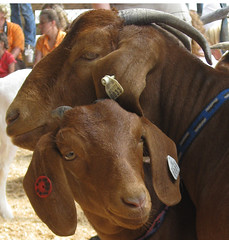The first Grow Our Flock webinar for 2014 has been scheduled. Managing Your Pastures Better: Management Intensive Grazing (MIG) 101 will be offered on April 22 at 5 p.m. MDT (7 p.m. EST). Register now by going to https://attendee.gotowebinar.com/register/5755892051703340802. After registering, a confirmation email about joining the webinar will be sent.
Sheep are magnificent animals that evolved to eat grass. A sheep's rumen allows it to thrive on high-fiber forage and effectively convert sunlight and atmospheric nitrogen into valuable human products like meat, wool and milk. But how can shepherds use sheep to harvest this forage in a profitable and sustainable way?
By grazing, shepherds can use sheep to harvest this forage in a profitable and sustainable way. Good grazing requires knowledge and good technique. This webinar will discuss how forages grow, how to use sheep to manage forage in a sustainable and efficient way and the principles of MIG. By properly managing forages, feeding costs can be reduced, pastures improved, weeds reduced, break-even price reduced and profits increased.
The webinar is being hosted by Dr. Jay Parsons from Colorado State University and Optimal Ag Consulting. The presenter is Dr. Woody Lane, a livestock nutritionist and forage specialist from Lane Livestock Services.
 |
| Dr. Woody Lane |
By grazing, shepherds can use sheep to harvest this forage in a profitable and sustainable way. Good grazing requires knowledge and good technique. This webinar will discuss how forages grow, how to use sheep to manage forage in a sustainable and efficient way and the principles of MIG. By properly managing forages, feeding costs can be reduced, pastures improved, weeds reduced, break-even price reduced and profits increased.
The webinar is being hosted by Dr. Jay Parsons from Colorado State University and Optimal Ag Consulting. The presenter is Dr. Woody Lane, a livestock nutritionist and forage specialist from Lane Livestock Services.




